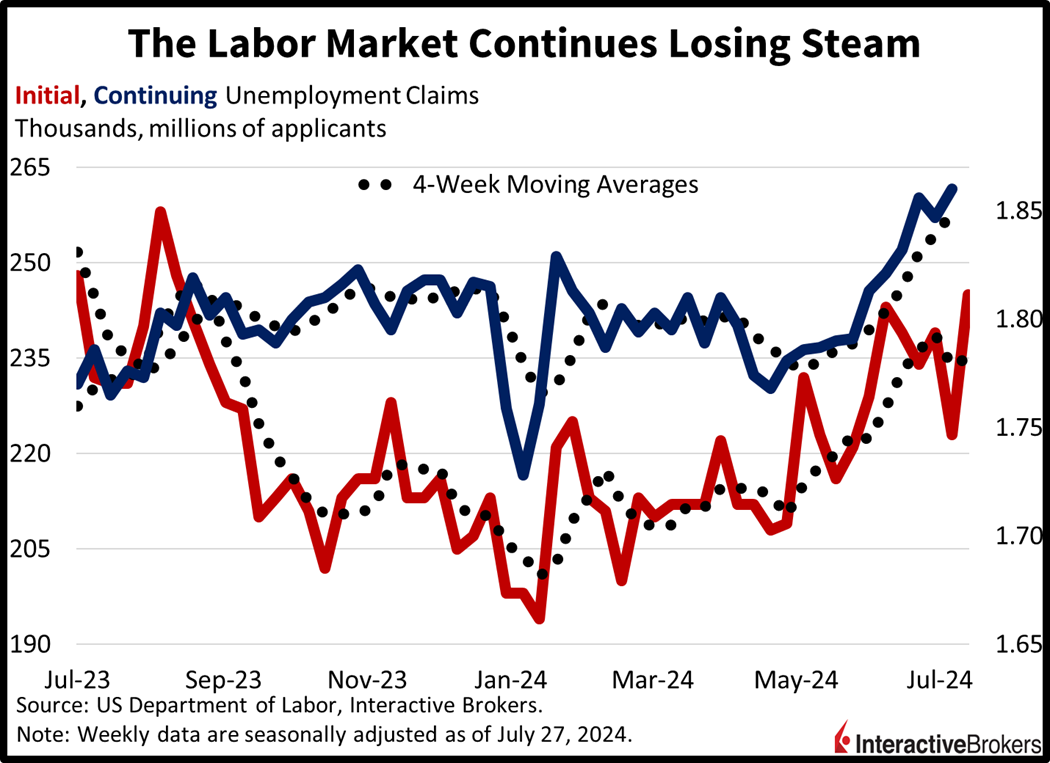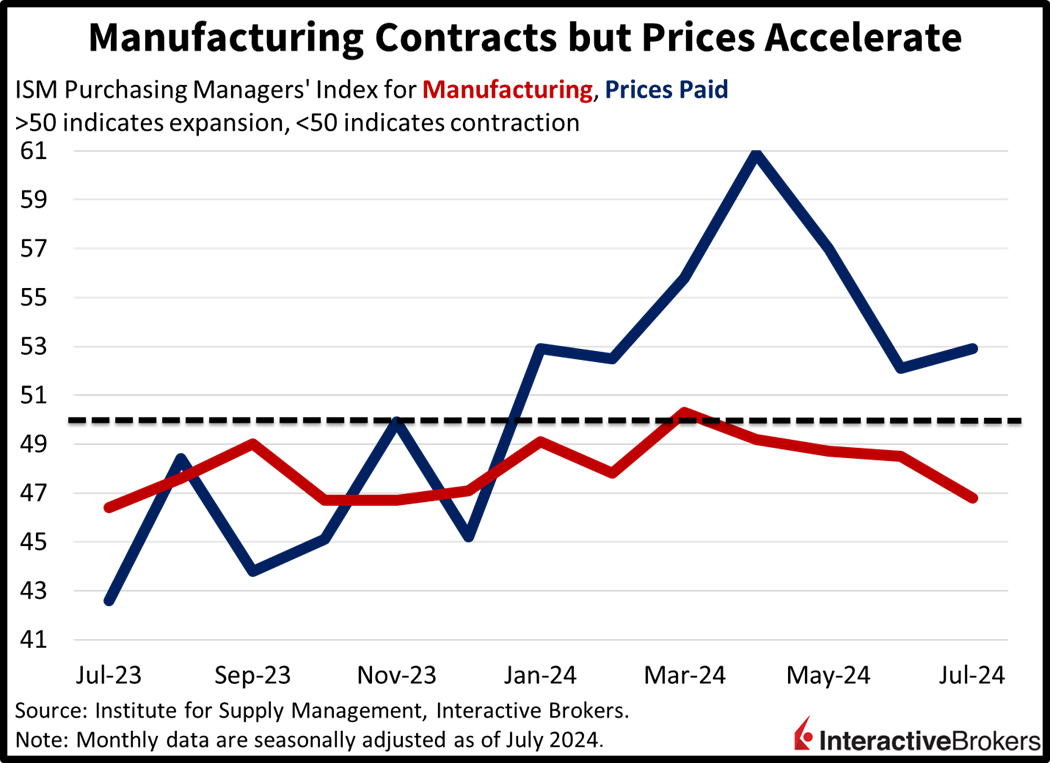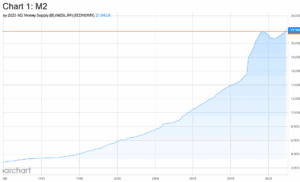The short-lived satisfaction of Fed Chief Powell communicating decent odds of a September rate cut has turned sour as investors are now panicking that the central bank isn’t trimming soon enough. Indeed, in our commentary yesterday, we warned that an afternoon reversal following the FOMC meeting was in the cards. While bulls kept their momentum to finish the month, bears kicked off August by capitalizing on much weaker-than-expected ISM-manufacturing and unemployment claim prints to push equities deep into the red in dramatic U-turn fashion. Market players are also worried that the US is among the last to begin accommodating monetary policy, with the BoE narrowly deciding to reduce borrowing costs this morning.
Job Market Continues to Soften
The labor market continues to reflect persistent weakness, with unemployment claim trends worsening in the past two weeks. Initial unemployment claims rose to 249,000 for the week ended July 27, much higher than the 236,000 projected and the 235,000 from the prior period. Continuing claims, meanwhile, increased to 1.877 million for the week ended July 20, above the previous interval’s 1.844 million and the median estimate of 1.860 million. Four-week moving averages also deteriorated on both fronts, rising from 235,500 and 1.852 million to 238,000 and 1.857 million. This morning’s release showing an increase in unemployment claims follows yesterday’s news from ADP of employers cutting back on hiring and slowing wage growth. Tomorrow’s non-farm payrolls will provide another fresh look into employer attitudes.

Manufacturing and Construction Sag
Reflecting further evidence of a decelerating economy, the manufacturing sector suffered a severe contraction last month. The Institute for Supply Management’s (ISM) Purchasing Managers’ Index for Manufacturing tanked deep into contraction territory, achieving a score of 46.8, beneath June’s 48.5 and the estimated 48.8. But despite orders and employment significantly weighing on the sector, prices gained momentum, accelerating to 52.9 from 52.1 on a month-to-month (m/m) basis.

Construction spending also showed weakness for the month of June, declining 3%, while analysts anticipated a 2% increase, but the Commerce Department’s data are stale because they do not reflect the recent bump in activity due to lighter mortgage rates.
Bank of England Cuts Key Rate
Policymakers with the Bank of England (BoE) voted 5-4 in narrow favor of an initial cut to the benchmark interest rate, lowering it 25 basis points (bps) to 5%. The central bank reached the decision despite services inflation in June reaching 5.7%, a result, in part, of a Taylor Swift tour driving up hotel prices, although inflation-linked telephone contracts were another factor. BoE Governor Andrew Baily said monetary policy committee members anticipate keeping the rate restrictive for a sufficiently long period of time as they expect overall inflation may climb from 2% to 2.75%. The central bank has maintained one of the most restrictive policies among developed nations, with a labor shortage and Brexit having fueled price pressures.
Artificial Intelligence Drives Strong Earnings While Household Goods Languish
Artificial Intelligence (AI) resulted in Meta and Qualcomm posting strong quarterly results while the formidable challenges faced by consumers have created a household goods recession. Consider the following earnings release summaries:
- Meta Platforms’ (META) earnings and revenue growth exceeded analyst consensus expectations with results bolstered by AI helping the company’s advertising platforms better target users. For the second quarter, revenue climbed 20% year over year, a decline of seven percentage points from the prior quarter. Overall advertising sales jumped 22% y/y while earnings soared 73%, a result, in large part, of the company trimming certain expenses, including labor costs, with Meta’s headcount dropping 1% y/y. Additionally, the advertising revenue growth helped offset the company’s increase in spending on AI technology. The midpoint of Meta’s current-quarter guidance exceeded the analyst consensus. After rallying 34% year to date, META climbed another 7% following last night’s earnings release.
- Qualcomm (QCOM) posted results that point to a potential turnaround in the sluggish mobile-phone market with sales of products used in handsets climbing 12% y/y and matching analysts’ expectations. Sales were strong among premier products that facilitate AI. Meanwhile, Qualcomm’s sales of semiconductors for the company’s much smaller automotive segment leaped 87% and licensing revenue for 5G applications also advanced. However, the internet of things area, which provides products for Meta’s Quest headsets and Windows laptops, declined. Nevertheless, both revenue and earnings exceeded analyst consensus expectations and the mid-range of Qualcomm’s current-quarter guidance met expectations. QCOM climbed 7% but then dropped 1% in after-hours trading.
- Western Digital (WDC), a manufacturer of computing memory devices, grew its revenue and net income per share 9% and 159%, respectively, with AI and cloud computing driving demand for the company’s products. However, revenue and earnings per share (EPS) adjusted for one-time events both missed analyst consensus estimates. David Goeckeler, Western Digital CEO, says AI is driving strong demand for storage devices and the company is working to continue to capitalize on growth opportunities created by the technology. The mid-range of the company’s outlook for current-quarter EPS fell slightly below analysts’ expectations while the top of Western Digital’s revenue guidance was $200 million less than Wall Street anticipated. WDC declined more than 10% this morning.
- Wayfair (W) executives said second-quarter weakness in home goods sales was comparable to the 2008 recession, with the company recording a loss that was slightly less than during the year-ago period. Sales fell 2% y/y despite the company launching its first large-format physical store. Both revenue and earnings fell short of analysts’ expectations. The company attributes the weakness to sluggish home sales dampening demand for furniture from new dwelling owners, inflation causing consumers to be more selective about their purchases and high interest rates. Consumers are continuing to show a preference for entertainment and clothing rather than household goods. In January, Wayfair announced it would lay off 13% of its workforce, or 1,650 employees. W declined more than 10% in pre-market trading.
Investors Are Approaching Panic
Markets are approaching panic mode as a plethora of economic factors converge and support a drift away from risk assets. Investors are dropping stocks like rocks and opting for Treasurys and Swiss francs instead. All major equity indices are in the red following sharp morning gains, with the Russell 2000, Nasdaq Composite, Dow Jones Industrial and S&P 500 benchmarks traveling south by 2.9%, 1.3%, 1.1% and 0.8%. Energy, technology and industrials are the heaviest laggards; they’re declining 2.3%, 2.1% and 1.9%. Sector breadth isn’t as dire, however, as market players are scooping up real estate, communication services and the defensive utilities, health care and consumer staples components; those segments are higher by 1.3%, 0.9%, 0.8%, 0.4% and 0.3%. Treasurys are getting bid up hand over fist with participants worried that the nation could fall into recession. The 2- and 10-year maturities are down 7 and 5 bps to 4.19% and 3.99%. The dollar is up though on the back of the BoE’s reduction this morning, with global traders viewing Washington as one of the last to provide accommodation. The greenback is gaining relative to all of its major counterparts ex-franc; it’s appreciating versus the euro, pound sterling, yen, yuan and Aussie and Canadian dollars. Commodities are also getting punished on demand concerns, with copper, silver, crude oil, lumber and gold lower by 2.3%, 1.8%, 1.7%, 0.2% and 0.1%.
Can Apple and Amazon Save Us?
While this year’s stock rally has been driven by AI and the technology’s potential to boost productivity and the bottom line, market players are worried about much greater problems. This evening’s reports from Apple and Amazon may provide bulls with short-term relief, especially if tomorrow’s non-farm payrolls report is well received. But this quarter, ladies and gentlemen, is all about the bears taking back some of the gains from the bulls. The headwinds for this market are just too stormy, especially considering that equities are priced for perfection. What are we seeing in the economy? imperfection. We’re going back to 5,000.
Visit Traders’ Academy to Learn More About ISM-Manufacturing and Other Economic Indicators
Disclosure: Interactive Brokers Affiliate
Information posted on IBKR Campus that is provided by third-parties does NOT constitute a recommendation that you should contract for the services of that third party. Third-party participants who contribute to IBKR Campus are independent of Interactive Brokers and Interactive Brokers does not make any representations or warranties concerning the services offered, their past or future performance, or the accuracy of the information provided by the third party. Past performance is no guarantee of future results.
This material is from IBKR Macroeconomics, an affiliate of Interactive Brokers LLC, and is being posted with its permission. The views expressed in this material are solely those of the author and/or IBKR Macroeconomics and Interactive Brokers is not endorsing or recommending any investment or trading discussed in the material. This material is not and should not be construed as an offer to buy or sell any security. It should not be construed as research or investment advice or a recommendation to buy, sell or hold any security or commodity. This material does not and is not intended to take into account the particular financial conditions, investment objectives or requirements of individual customers. Before acting on this material, you should consider whether it is suitable for your particular circumstances and, as necessary, seek professional advice.




















Join The Conversation
For specific platform feedback and suggestions, please submit it directly to our team using these instructions.
If you have an account-specific question or concern, please reach out to Client Services.
We encourage you to look through our FAQs before posting. Your question may already be covered!